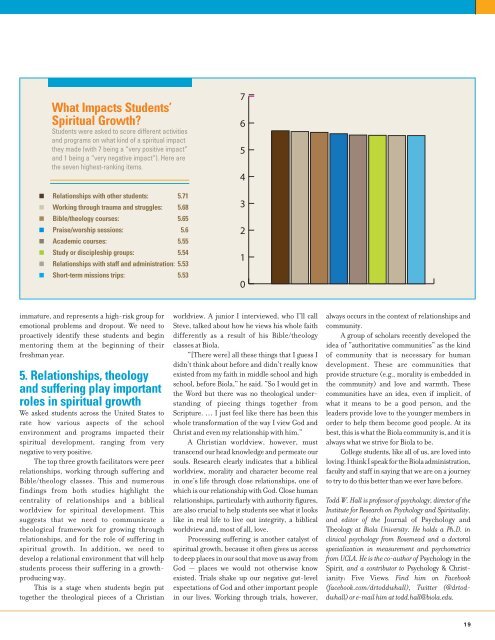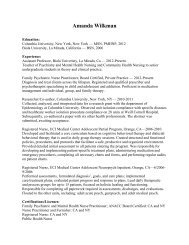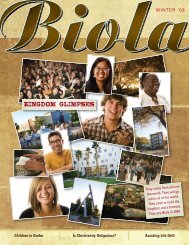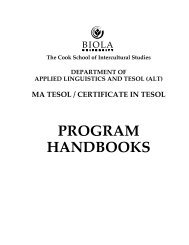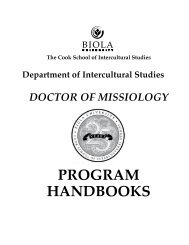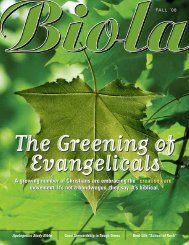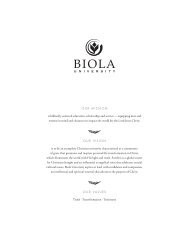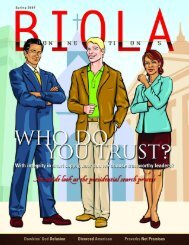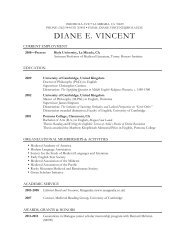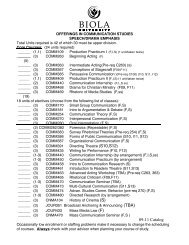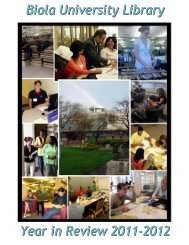Create successful ePaper yourself
Turn your PDF publications into a flip-book with our unique Google optimized e-Paper software.
■<br />
■<br />
■<br />
■<br />
■<br />
■<br />
■<br />
■<br />
immature, and represents a high-risk group for<br />
emotional problems and dropout. We need to<br />
proactively identify these students and begin<br />
mentoring them at the beginning of their<br />
freshman year.<br />
5. Relationships, theology<br />
and suffering play important<br />
roles in spiritual growth<br />
We asked students across the United States to<br />
rate how various aspects of the school<br />
environment and programs impacted their<br />
spiritual development, ranging from very<br />
negative to very positive.<br />
The top three growth facilitators were peer<br />
relationships, working through suffering and<br />
Bible/theology classes. This and numerous<br />
findings from both studies highlight the<br />
centrality of relationships and a biblical<br />
worldview for spiritual development. This<br />
suggests that we need to communicate a<br />
theological framework for growing through<br />
relationships, and for the role of suffering in<br />
spiritual growth. In addition, we need to<br />
develop a relational environment that will help<br />
students process their suffering in a growthproducing<br />
way.<br />
This is a stage when students begin put<br />
together the theological pieces of a Christian<br />
F A L L ’ 0 9<br />
What Impacts Students’<br />
Spiritual Growth?<br />
Students were asked to score different activities<br />
and programs on what kind of a spiritual impact<br />
they made (with 7 being a “very positive impact”<br />
and 1 being a “very negative impact”). Here are<br />
the seven highest-ranking items.<br />
Relationships with other students: 5.71<br />
Working through trauma and struggles: 5.68<br />
Bible/theology courses: 5.65<br />
Praise/worship sessions: 5.6<br />
Academic courses: 5.55<br />
Study or discipleship groups: 5.54<br />
Relationships with staff and administration: 5.53<br />
Short-term missions trips: 5.53<br />
7<br />
6<br />
5<br />
4<br />
3<br />
2<br />
1<br />
0<br />
worldview. A junior I interviewed, who I’ll call<br />
Steve, talked about how he views his whole faith<br />
differently as a result of his Bible/theology<br />
classes at <strong>Biola</strong>.<br />
“[There were] all these things that I guess I<br />
didn’t think about before and didn’t really know<br />
existed from my faith in middle school and high<br />
school, before <strong>Biola</strong>,” he said. “So I would get in<br />
the Word but there was no theological under -<br />
standing of piecing things together from<br />
Scripture. … I just feel like there has been this<br />
whole transformation of the way I view God and<br />
Christ and even my relationship with him.”<br />
A Christian worldview, however, must<br />
transcend our head knowledge and permeate our<br />
souls. Research clearly indicates that a biblical<br />
worldview, morality and character become real<br />
in one’s life through close relationships, one of<br />
which is our relationship with God. Close human<br />
relationships, particularly with authority figures,<br />
are also crucial to help students see what it looks<br />
like in real life to live out integrity, a biblical<br />
worldview and, most of all, love.<br />
Processing suffering is another catalyst of<br />
spiritual growth, because it often gives us access<br />
to deep places in our soul that move us away from<br />
God — places we would not otherwise know<br />
existed. Trials shake up our negative gut-level<br />
expectations of God and other important people<br />
in our lives. Working through trials, however,<br />
always occurs in the context of relationships and<br />
community.<br />
A group of scholars recently developed the<br />
idea of “authoritative communities” as the kind<br />
of community that is necessary for human<br />
development. These are communities that<br />
provide structure (e.g., morality is embedded in<br />
the community) and love and warmth. These<br />
communities have an idea, even if implicit, of<br />
what it means to be a good person, and the<br />
leaders provide love to the younger members in<br />
order to help them become good people. At its<br />
best, this is what the <strong>Biola</strong> community is, and it is<br />
always what we strive for <strong>Biola</strong> to be.<br />
College students, like all of us, are loved into<br />
loving. I think I speak for the <strong>Biola</strong> admin istra tion,<br />
faculty and staff in saying that we are on a journey<br />
to try to do this better than we ever have before.<br />
Todd W. Hall is professor of psychology, director of the<br />
Institute for Research on Psychology and Spirit uality,<br />
and editor of the Journal of Psychology and<br />
Theology at <strong>Biola</strong> <strong>University</strong>. He holds a Ph.D. in<br />
clinical psychology from Rosemead and a doctoral<br />
special iza tion in measurement and psycho metrics<br />
from UCLA. He is the co-author of Psych ology in the<br />
Spirit, and a contributor to Psychology & Christ -<br />
ianity: Five Views. Find him on Facebook<br />
(facebook.com/drtoddwhall), Twitter (@drtoddwhall)<br />
or e-mail him at todd.hall@biola.edu.<br />
1 9


